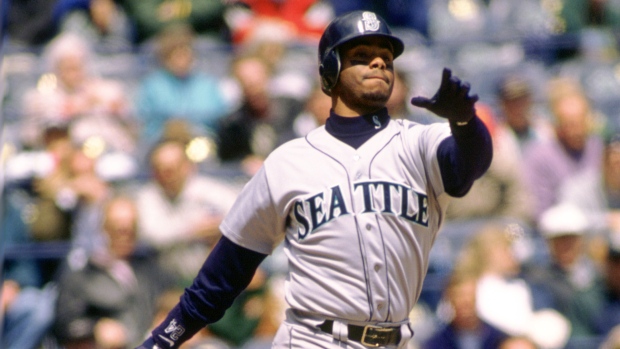Jun 12, 2020
Griffey Jr.'s '97 season set the stage for the Summer of '98
Mark McGwire and Sammy Sosa's home run chase of 1998 and the controversial fallout that followed are the subject of ESPN’s latest 30 for 30 film, Long Gone Summer, directed by A.J. Schnack, which debuts Sunday at 9pm et on TSN. Ken Griffey Jr. made his own run at the record in 1997, setting the stage for the drama of 1998.

The summer of 1998 was very different for baseball fans. After watching players try -- but ultimately fail -- to reach Roger Maris’ single-season record of 61 homers, two players, Mark McGwire of the St. Louis Cardinals and Sammy Sosa of the Chicago Cubs, would rewrite the record books, changing one of baseball’s most famous numbers forever.
The home run chase of 1998 and the controversial fallout that followed are the subject of ESPN’s latest 30 for 30 film, Long Gone Summer, directed by A.J. Schnack, which debuts Sunday at 9pm et on TSN.
When Cecil Fielder hit 51 homers for the Detroit Tigers in 1990, he became the first Major Leaguer to eclipse the 50 home run mark since George Foster hit 52 for the Cincinnati Reds in 1977, ushering in a new era of sluggers and reigniting interest in someone breaking Maris’ record.
McGwire hit 52 homers in 1996 while still a member of the Oakland Athletics and the race for history was back in the spotlight.
Ken Griffey Jr. thrust himself into the spotlight in the 1997 season when he homered in his first and second at-bats of the season against the New York Yankees.
The Kid opened the season on a steady run, but a three-homer game against the Toronto Blue Jays, the first two off seven-time Cy Young Award winner Roger Clemens in late April, would cap off a historic 13 home run April.
By the end of May, Griffey had 24 home runs, well beyond a 61 home run pace.
When he arrived at Jacobs Field for the 1997 All-Star Game in Cleveland, Griffey had 30 homers on the board and with his team also surging in the standings, all eyes were on him.
A post All-Star game slump would put his home run chase in a hole. The slugger was dealing with the death of his mother-in-law and, understandably, his power numbers suffered.
From June 23 to July 24 he would only go deep once, a period of the campaign he would comment on after the season.
''June and July were kind of tough,'' said Griffey. ''I wasn't so much worried about myself, but my wife and my kids. But I think they hung in there a lot better than I did. I struggled, but a lot of people didn't know why.''
Griffey reached 50 homers on Sept. 7, but was going to need a strong final month of the season to eclipse the record.
The future Hall of Famer would finish the season with 56 homers, falling five short of reaching Maris.
McGwire, who would go on to break the record the following season, would actually lead the majors with 58 homers, though his totals would be split between the Oakland Athletics, where he would post 34 homers prior to being dealt on July 31, and the St Louis Cardinals where he would finish the season with 24 more round trippers.
Griffey would have an identical monster home run year in 1998, bashing another 56 for the Mariners, but with both McGwire and Sosa surpassing the home run record, his season would get lost in the shuffle.
For his efforts in 1997, Griffey was named American League Most Valuable Player.

